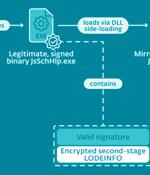Security News

Your profile can be used to present content that appears more relevant based on your possible interests, such as by adapting the order in which content is shown to you, so that it is even easier for you to find content that matches your interests. Content presented to you on this service can be based on your content personalisation profiles, which can reflect your activity on this or other services, possible interests and personal aspects.

The Japan Aerospace Exploration Agency was hacked in a cyberattack over the summer, which may have put sensitive space-related technology and data at risk. The security breach was discovered this autumn when law enforcement authorities alerted Japan's space agency that its systems were compromised, as first reported by The Yomiuri Shimbun.

Cybersecurity agencies from Japan and the U.S. have warned of attacks mounted by a state-backed hacking group from China to stealthily tamper with branch routers and use them as jumping-off points...

The BlackCat/ALPHV ransomware gang has added Seiko to its extortion site, claiming responsibility for a cyberattack disclosed by the Japanese firm earlier this month.Seiko apologized to the potentially impacted customers and business partners and urged them to be vigilant against email or other communication attempts potentially impersonating Seiko.

Entities using the name and iconography of Anonymous claim to have conducted cyberprotests against the Japanese government for actions related to the release of wastewater from the Fukushima Daini Nuclear Power Plant. In an operation dubbed "Tango Down", The Anonymous Italia Collective claims to have attacked 21 government and other websites associated with the decision to release wastewater from the Fukushima facility, which in 2011 infamously experienced damage to three reactor cores after an earthquake and tsunami disabled safety systems.

An unknown cryptocurrency exchange located in Japan was the target of a new attack earlier this month to deploy an Apple macOS backdoor called JokerSpy. Elastic Security Labs, which is monitoring the intrusion set under the name REF9134, said the attack led to the installation of Swiftbelt, a Swift-based enumeration tool inspired by an open-source utility called SeatBelt.

Japanese pharma giant Eisai today confirmed to The Register that "There is no imminent risk of stock shortage" after it was hit by ransomware at the weekend. Its Japanese parent group confirmed earlier this week it had taken offline "Certain systems" both inside and outside of Japan, including "Logistics systems" after some of its servers were encrypted by ransomware.

Pharmaceutical company Eisai has disclosed it suffered a ransomware incident that impacted its operations, admitting that attackers encrypted some of its servers. Eisai is a Tokyo-based pharmaceutical company with an annual revenue of $5.3 billion and over 10,000 employees.

Zurich’s Japanese outpost also leaks a couple of million records Global insurer Aflac's Japanese branch has revealed that personal data describing more than three million customers of its cancer...

A Chinese-speaking advanced persistent threat actor codenamed MirrorFace has been attributed to a spear-phishing campaign targeting Japanese political establishments. The activity, dubbed Operation LiberalFace by ESET, specifically focused on members of an unnamed political party in the nation with the goal of delivering an implant called LODEINFO and a hitherto unseen credential stealer named MirrorStealer.